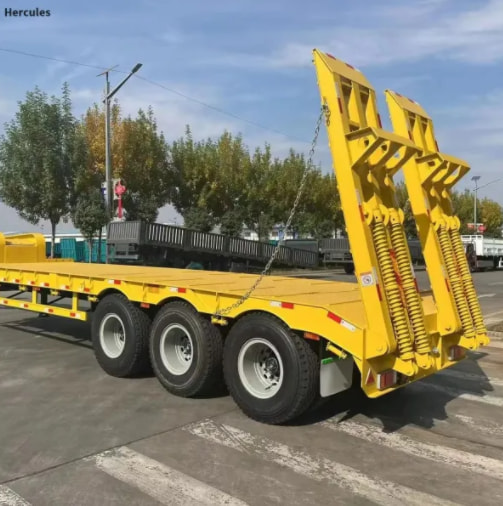Understanding the Different Types of Semi-Trailers and Their Uses
In today’s logistics and transportation industry, semi-trailers play a pivotal role in ensuring goods are moved efficiently and safely across long distances. As industries demand more specialized transportation solutions, the variety and customization of semi trailers have grown significantly. Professionals in the freight and transportation sectors are continually seeking the best semi-trailer types to match their unique needs, ensuring they can transport goods of varying sizes, weights, and conditions.
The Core Features and Functions of Semi-Trailers
A semi-trailer is a type of trailer designed to be towed by a motorized vehicle, such as a truck. Unlike full trailers, semi-trailers have no front wheels and rely on the truck's support for balance and movement. Semi-trailers are typically categorized based on their structure, capacity, and intended use.
The main types of semi-trailers include flatbed trailers, dry vans, refrigerated trailers, lowboy trailers, and tanker trailers. Each type is tailored for different transportation needs:
Flatbed Trailers: Known for their versatility, flatbeds are used to carry loads that do not require enclosure. This can include construction materials, machinery, and large equipment.
Dry Van Trailers: These enclosed trailers are the most common for transporting dry goods such as retail products, furniture, and electronics. They protect goods from the elements and are equipped with a full set of doors for easy loading and unloading.
Refrigerated Trailers (Reefers): Essential for transporting perishable goods like food and pharmaceuticals, refrigerated trailers come with built-in cooling systems that regulate temperature.
Lowboy Trailers: These trailers are used to carry oversized, heavy equipment such as construction machinery and industrial plants. Their low profile provides stability for heavy loads.
Tanker Trailers: Specially designed for transporting liquids, gases, and chemicals, tanker trailers are built with materials that prevent leaks and ensure safety during transport.
Advantages and Application Scenarios of Semi-Trailers
The types of semi-trailer chosen largely depend on the application scenario. Each trailer type offers specific advantages for different industries:
Flatbed Trailers: Their open design makes it easier to load and unload oversized cargo. They are widely used in the construction, manufacturing, and agriculture sectors for transporting machinery, steel, and large equipment.
Explore more:
Transportation
How Does Fence Semi Trailer Work?Dry Van Trailers: These are ideal for businesses involved in retail, electronics, or consumer goods. Their secure, enclosed nature ensures that cargo remains undamaged, no matter the weather conditions.
Refrigerated Trailers: The demand for perishable goods transportation has increased with the growth of the food and pharmaceutical industries. Reefers ensure products like fruits, vegetables, dairy, and medicines are kept at optimal temperatures throughout the journey.
Lowboy Trailers: Used for transporting large, heavy machinery, these trailers offer maximum stability. They are favored in industries like construction, mining, and heavy equipment sales.
Tanker Trailers: Tankers are essential for transporting liquids like fuel, chemicals, and food-grade liquids. Their design ensures that hazardous or sensitive liquids are safely transported over long distances.
Successful Cases and User Feedback
Many businesses have found success in using the appropriate types of semi-trailer for their logistics needs. For instance, a leading construction company was able to streamline its operations by adopting lowboy trailers to transport large bulldozers, excavators, and cranes. The lower center of gravity and larger capacity reduced the time spent loading and unloading, increasing overall efficiency.
Similarly, a global food distribution company turned to refrigerated trailers to maintain strict temperature control during the transport of perishable goods. With these specialized trailers, the company was able to ensure product quality, reduce waste, and improve delivery time, thus enhancing customer satisfaction.
The Future of Semi-Trailers and Industry Trends
The future of semi-trailers is closely tied to advances in technology, sustainability, and customization. As the demand for eco-friendly transportation solutions grows, manufacturers are integrating fuel-efficient designs and lighter materials to reduce emissions and improve fuel economy.
Additionally, the rise of automation in logistics and trucking is leading to the development of smart trailers that can communicate with fleet management systems, providing real-time data on location, temperature, and load conditions. These innovations will continue to make semi-trailers more efficient, safer, and cost-effective.
Conclusion
Choosing the right types of semi-trailer for your business can significantly impact efficiency, cost, and safety in transporting goods. Whether you need to move large equipment, perishable items, or everyday products, the right semi-trailer is a key to success. By understanding the core features, advantages, and future trends, you can make an informed decision that best suits your business needs.
To learn more about the different types of semi-trailers and how they can enhance your logistics operations, feel free to contact us today. Our team is ready to provide expert guidance and help you choose the perfect semi-trailer for your needs.


